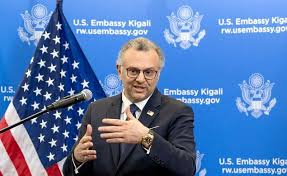Efforts to resolve the conflict between the Democratic Republic of Congo (DRC) and Rwanda may soon see Congolese minerals such as tungsten, tantalum, and tin legally exported to Rwanda for processing, sources told Reuters. This development comes as part of a US-brokered peace deal aimed at ending fighting linked to Rwanda-backed M23 rebels in eastern Congo.
Kinshasa has long accused Rwanda of illegally exploiting its mineral wealth, which many believe fuels ongoing conflict. The DRC government alleges Rwanda smuggles tens of millions of dollars worth of minerals monthly across their shared border to sell them from within Rwanda. These accusations have deepened mistrust between the neighbours, intensifying clashes in the region since January 2024.
Washington is pressing both countries to sign a peace agreement this summer, which would be paired with new mineral trade deals intended to unlock billions of dollars in Western investments in the mining sector. Massad Boulos, senior adviser for Africa to former US President Donald Trump, told Reuters earlier in May that the US had already provided a draft deal to both sides, though the details remain confidential.
According to two diplomatic sources and one UN official familiar with the negotiations, the proposed agreement could transform artisanal mining zones in eastern Congo by allowing minerals to be refined and marketed from Rwanda legally. One diplomat explained Washington’s position: “If Rwanda can legitimately benefit from Congo’s minerals through processing, it will be less tempted to occupy its neighbour and plunder its minerals.” He added that industrialising mineral processing in Congo would increase government revenue, improve mineral traceability, and reduce armed groups profiting from illegal mining.
A Congolese government spokesperson deferred questions about the plan to the foreign ministry, which did not respond to requests for comment. A Congolese official, speaking anonymously, said no cooperation on minerals would happen without Rwanda withdrawing its troops and proxies, referring to the M23 rebel group, which controls increasing territory in eastern Congo. The official stressed Rwanda must respect Congo’s sovereignty, including over its minerals.
For Rwanda, the deal could bring a major inflow of legal cash to clean up what has so far been a mostly illicit sector of its economy. For the US, the agreement would provide greater access to Congo’s vast mineral resources, which are currently dominated by Chinese companies.
The US State Department confirmed that Congo and Rwanda had signed a declaration in Washington last month committing to creating “transparent, formalized, and licit end-to-end mineral value chains from mine to processed metal,” with US government and investor support.
Although details about investment scale and actors remain unclear, Boulos said US officials have engaged “probably up to 30” investors interested in mining business and downstream processing in Rwanda. The US International Development Finance Corporation (DFC), which mobilises private capital for US foreign policy goals, has promised full backing for related transactions and investments.
However, the long history of violence in the Great Lakes region means companies investing in the mining sector face significant risks of loss due to instability.
The sources also caution that mineral projects alone will not end the conflict, which traces back to the 1994 Rwandan genocide. “A mining agreement cannot bring peace. These projects will take three, five or 10 years,” said one diplomat. “There are immediate problems and root causes that need to be addressed.”
Kinshasa, the UN, and the US have repeatedly accused Rwanda of profiting from illegal exploitation of Congolese minerals — allegations Rwanda denies. Earlier attempts at official mining cooperation faltered. A 2021 deal on gold exploitation was suspended by Congo in 2022 after accusing Rwanda of supporting M23 rebels who captured the border town of Bunagana.
Rwanda denies backing M23 but admits taking “defensive measures” against Rwandan Hutu militias operating in eastern Congo. Analysts say the main militia group cited, the Democratic Forces for the Liberation of Rwanda (FDLR), has weakened significantly.
One diplomat described Kigali’s frustration with Kinshasa’s unreliability in negotiations. “The collapse of the Sakima deal bothered them,” said the source, adding “Neither country trusts each other.” William Millman, an independent mining consultant familiar with the region, said: “Unless you’ve got somebody with a big club, like the United States, they’re not going to honour agreements.”
The US hopes its involvement will finally bring lasting peace and stability to the mineral-rich but conflict-plagued region, while opening economic opportunities that benefit both countries and their people.
